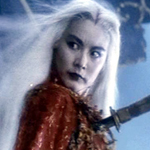
 This is the one. THE BRIDE WITH WHITE HAIR is the movie that put Ronny Yu on the map. Or at least mine. This was 1993, back when people like me were first discovering Hong Kong cinema, and martial artists flying around on wires seemed like the greatest discovery since their primary antagonist, gravity. I remember waiting weeks for a widescreen, subtitled VHS I special ordered from Suncoast Motion Picture company in a mall somewhere. I must’ve watched it several times in the ’90s, but when I revisited it for this series it had been so long that I could only recall the look and feel of it, and basically nothing about the story.
This is the one. THE BRIDE WITH WHITE HAIR is the movie that put Ronny Yu on the map. Or at least mine. This was 1993, back when people like me were first discovering Hong Kong cinema, and martial artists flying around on wires seemed like the greatest discovery since their primary antagonist, gravity. I remember waiting weeks for a widescreen, subtitled VHS I special ordered from Suncoast Motion Picture company in a mall somewhere. I must’ve watched it several times in the ’90s, but when I revisited it for this series it had been so long that I could only recall the look and feel of it, and basically nothing about the story.
The way I remember it, we all agreed back then that this movie was a masterpiece. But here I am 30 years later, and I don’t think the generation of film fans after mine would necessarily know who Ronny Yu was if I asked, or have heard of this movie. It has recently finally come to remastered blu-ray overseas, so a good transfer was on a streaming service for a while, and now can be bought digitally, but when I started writing this series there was only the old Tai Seng DVD – a pretty rough, non-anamorphic transfer. It made me wish I’d saved that tape. Watching it now, of course, it lacks the freshness and novelty it had in 1993, the thrill of a new world opening up to us. We’ve seen this kind of fantastic martial arts world imagined many more times and in much more detail over the last quarter century.
But I think THE BRIDE WITH WHITE HAIR still packs a punch. It’s a short, sweet, and stylish little tragic love story that speaks about good and evil but refuses to paint even its operatic fantasy world in such easily definable categories. And by looking at it as part of this Uncle Sam Wants Yu series I’m able to see it as a culmination of everything the director had been working on up to that point.
It’s the story of Cho Hi Yang (Leslie Cheung, A BETTER TOMORROW), a rebellious, highly skilled swordsman of Wu Tang who is slotted to become the Joint Chief of the eight clans, but one of the elders, Uncle Pai Yun, totally Snapes him in an attempt to get his daughter Lu Hua (Lam Kit Ying, WITCH FROM NEPAL) that coveted job. (Credit where credit is due: they explicitly note that it goes against tradition for a woman to be in charge, so this snooty asshole’s nepotism could be considered pretty progressive.)
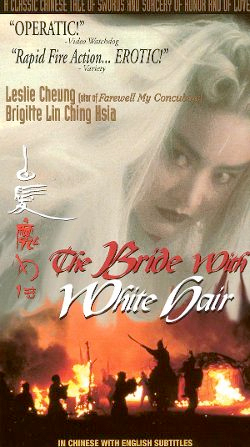
We first meet Master Cho sitting on top of Mount Shing Fung, where he’s been waiting ten years for a woman. And he doesn’t even know if she knows he’s waiting for her. (This was before texting.) He narrates the movie and flashes back to his childhood, when he first met this woman. He was almost eaten by a pack of wolves – his greatest fear – when a mysterious girl called them away by playing a pipe from the top of a cliff.
The details of the incident tell us alot about Cho. He’s carrying a lamb when it happens, and later gets in trouble for having stolen it. But in his eyes he rescued it from being butchered. So we can see how his heroic instincts also get him branded a troublemaker. He’s not pure, though – for a moment he leaves the lamb as wolf bait and says “I’m leaving now. You take care!” But he can’t go through with it.
When he’s older his misadventures turn into stabbing attempted rapists and brothel-bill-jumpers and shit. The other Wu Tang youths all love him and sneak him food while he’s being punished. When he sees the wolf girl (Brigitte Lin, ZU: WARRIORS FROM THE MAGIC MOUNTAIN, POLICE STORY, CHUNGKING EXPRESS) again it’s a Romeo and Juliet situation. See, after being raised by the wolves she was adopted by “the evil cult” led by conjoined twins called Chi Wushuang (Francis Ng [KUNG FU CULT MASTER, THE MISSION] and Elaine Lui [FIGHTING MADAM, ONCE UPON A TIME IN CHINA V]), who the eight clans feel threatened by. Also, with all due respect to the wolf girl, she’s a straight up ferocious witch. In her first appearance as a grown up she flies in to single-handedly massacre a royal army slaughtering starving peasants for stealing food. She uses a whip to slice a bunch of soldiers in half, leaving a lower body riding a horse, etc. One guy yells “I’ll chop you into nine pieces!,” so she makes sure that’s how many she leaves him in. It’s like an improv comedian or freestyle rapper taking suggestions from the crowd.
The cult live in a huge Zion-in-THE-MATRIX-RELOADED type cave where they wear big hats and enjoy such religious activities as shirtless dancing, drumming, chanting and burning torches. I think the wolf girl has some kind of special rank (Chief Convoy?), because she gets to lounge around smoking a pipe and being handed drinks by little kids. Or maybe it’s just because the male half of the twins has a huge crush on her. This is a guy who uses his magic powers to Darth Vader a guy for coughing during his speech, but luckily he doesn’t believe in forcing his love on the wolf girl. He needs it to be real. At least at first.
When the leaders of the clans appoint Cho to lead the army against the cult, he tries to refuse and nominate Lu Hua for the job. This is kind of fucked up from a relationship standpoint, because he’s trying to avoid fighting the woman he has a crush on by giving the job to one who clearly has one on him! But it’s not only love that makes him a conscientious objector. He really believes “the foreign clans have done us no wrong” and doesn’t want to “do things against my convictions.” Which is admirable.
So instead of going to war, Cho and the wolf girl run off together. Or fly off, actually. He sucks poison from her and they do some romance in a picturesque grotto. You know how it is. He finds out that she only remembers her surname – Lien – so he names her Lien Ni Chang. And giving her a name is powerful. The cult just wants her to be wolf girl. They’re not ready to deal with Lien Ni Chang.
The stunt coordinator/action director is Philip Kwok, a.k.a. Mad Dog from HARD BOILED, who had done THE FLAG OF IRON (1980), HOLY FLAME OF THE MARTIAL WORLD (1983), A CHINESE GHOST STORY (1987), STORY OF RICKY (1992), and many others. There’s lots of gliding through the air and spinning with whooshy sound effects, which I appreciate. Lien flies through trees, hops off of walls, uses her long hair as a whip or like a spider web she can tangle people in. Yu likes to use a frame-stepping effect to give it a dreamy feel, which kind of messes with the flow of the action in my opinion, but it doesn’t happen all the time. (It will eventually start to seem like one of his trademarks.)
There are many great martial arts concepts: Young Cho practicing “the Dragon Moon Breaking Sword steps” by blocking a cloud of falling flower petals and collecting them in a big clump on his blade without any touching his body. Fighting off a mob of sword-wielding cultists using a non-lethal frond. Ni Chang having to exit the cult by walking barefoot over hot coals and blades, withstanding a gauntlet of cultists beating her with sticks, without using her kung fu.
We hear that the twins are great fighters, but they mostly cheat and use magic. They’re cool villains because they’re so theatrical – one of them speaking and then spinning around for the other one to speak. They wear glitter makeup and fluttery eyebrow extensions and if I was their enemy I would tease them about dressing like the flying monkeys from THE WIZARD OF OZ.
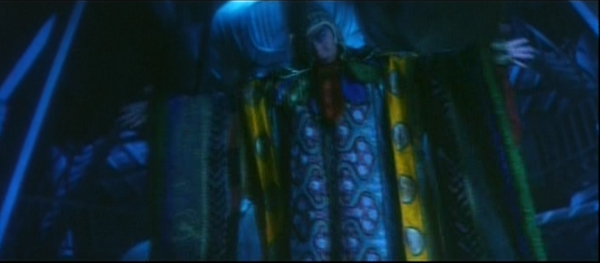
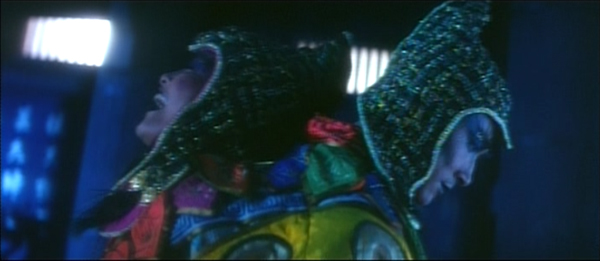
(Now might be a good time to mention costume designer Emi Wada, who had won an Oscar for Akira Kurosawa’s RAN, and would go on to do great work on HERO, HOUSE OF FLYING DAGGERS, REIGN OF ASSASSINS and SAMURAI MARATHON.)
The twins may have been unfairly driven out of the kingdom, but they’re so openly wicked now you can’t feel too sorry for them. Still, it’s a nice moment when the heartbroken male twin is cutting himself and his sister has to feel it. Even better (SPOILER SPOILER SPOILER), after getting fatally separated via-sword the male likes the feeling of laying on his back. A little bit of an ELEPHANT MAN moment.
This is the first of four collaborations between Yu and cinematographer Peter Pau. Pau had already shot THE KILLER (1989), THE SWORDSMAN (1990) and THE EAGLE SHOOTING HEROES (1993) (the latter of which also starred Cheung and Lin). Like Yu he’d be headed to Hollywood soon, not only to do Yu’s films but Tsui Hark’s DOUBLE TEAM (1997), plus DRACULA 2000 (2000)(!?) and SHOOT ‘EM UP (2007). But his best known work would be bringing the wire-fu fantasy wuxia style to the world with Ang Lee’s CROUCHING TIGER, HIDDEN DRAGON (2000), for which he’d win an Oscar, and he later did a specifically American take on the genre, THE FORBIDDEN KINGDOM (2008).
Art director Eddie Ma had just done ONCE UPON A TIME IN CHINA II and WICKED CITY (both 1992). He didn’t work with Yu again, despite what seems like a very successful collaboration. I like the stylized sound stage look of it. Painterly visual flourishes – exaggerated blue or orange skies, slow motion closeups of splashing puddles, long shadows, silhouetted figures, illuminated mists of either fog or blood – recall the watercolors under the opening credits.
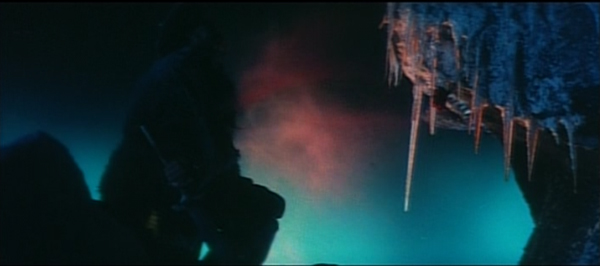
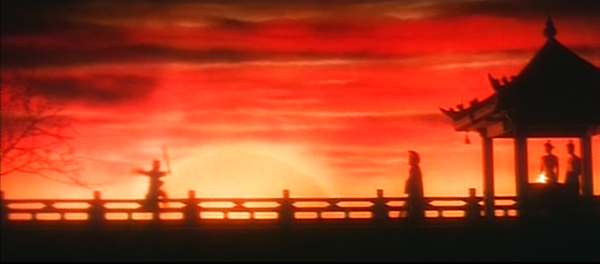
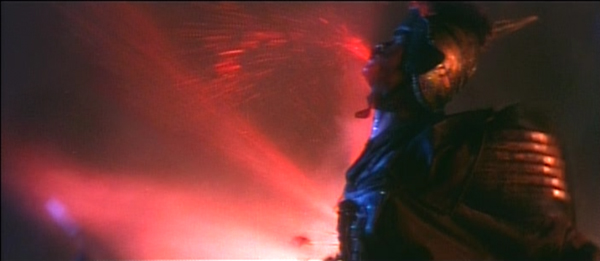
The score is kind of more harsh and electronic than you’d expect from those elegant photos, but I like it. The keyboard sounds remind me at times of MORTAL KOMBAT, at other times THE KILLER, at others THE TERMINATOR. Composer Richard Yuen (IN THE LINE OF DUTY 4, THE KING OF KICKBOXERS, AMERICAN SHAOLIN, BLOODMOON) had previously worked with Yu on LEGACY OF RAGE.
There’s also a love ballad theme song performed by Cheung, who was Yu’s only choice for the lead role, against the wishes of producers who wanted a martial artist. Yu felt the character needed Cheung’s sensitivity, and called him “a James Dean in Chinese ancient costume,” correctly predicting that would appeal to westerners.
The screenplay is credited to Lam Kee-To (THE SWORDSMAN, THE MASTER), David Wu (also editor of this film, and of many John Woo classics), Elsa Tang (ONCE UPON A TIME IN CHINA, IRON MONKEY, WING CHUN) and Yu. The story loosely comes from a 1957 wushu novel by Liang Yusheng (SEVEN SWORDS). It was previously adapted into STORY OF THE WHITE-HAIRED DEMON GIRL (1959), WHITE HAIR DEVIL LADY (1980), the Taiwanese film WOLF DEVIL WOMAN a.k.a. WOLFEN NINJA (1982), and later THE ROMANCE OF THE WHITE HAIR MAIDEN (1995) and THE WHITE HAIRED WITCH OF THE LUNAR KINGDOM (2014), as well as TV series’ in 1978, 1986, 1995, 1999 and 2012.
From the sounds of it the book is much more complicated than Yu’s version, but does have the meeting on a mountain, the forbidden romance, the feeling of betrayal that turns her hair white, and the rare flower that he protects in hopes of giving to her. (In the book it would turn her hair black again instead of giving her eternal life.)
According to this Leslie Cheung biography, Yu had travelled to Australia to visit the then-80-year-old novelist for permission to adapt loosely and “make it more modern,” with additions like the conjoined twin villains, inspired by a documentary he saw on the Discovery Channel. “OK… go… whatever,” Liang said, but then added, “Mr. Yu?… Don’t embarrass me.”
I really like this story, and also it’s a bummer. Cho behaves heroically. He fights bad guys, stands up for his beliefs, tries to stop a war. Nobody else around him does these things. Yet his actions are going to cause catastrophe. In the end the society that tells him he shouldn’t be with this wolf girl is actually right. I guess you could say that of Romeo and Juliet too. But it has been pointed out that instead of the two lovers dying, as in the Shakespeare story, they’re the only ones who don’t die.
Even if shit doesn’t work out, I like the way Cho has to choose from differing advice from two different mentors. The first thing he tells us about his master Tzu Yang (Fong Pau, DRUNKEN MASTER 2) is that “He was tireless in explaining to me the misgivings of our world and the differences between good and evil.” Tzu Yang says that “Good and evil are like oil and water, they will never mix.” But to him “good” is the Wu Tang and “evil” is anybody who opposes them. Years later, he laughs at Cho’s talk about the virtues of being “kind-hearted.” So who’s really the good guy?
Hard-drinking general Wu San-Kuei (Eddy Ko, THE EAST IS RED, HEROES SHED NO TEARS, LETHAL WEAPON 4), who finds young Cho in the woods after the wolf attack, encourages less tribalism, more individuality. He tells him, “Fear not the criticisms of others, as long as you are at peace with yourself. What kind of life would it be if you always have to look to others for approval? You’re better off dead.” Cho retains that lesson into adulthood, even when the general shares his master’s attitude, and laughs off Cho’s idea of quitting to become a recluse. (The general also makes some disappointing moral choices, which I would’ve seen coming if I had known of him as an actual historical figure.)
The Master raised Cho and taught him many good things, but it’s clear that he’s wrong. His world view is too simplistic. In this story “evil” people start out as “good” people who change after they’ve been wronged. The twins feel wronged by the kingdom, and when another male-female pair are driven out I think the implication is that they could have a similar future ahead of them. Most notably Ni Chang tragically becomes possessed of evil from feeling betrayed by Cho. These things could actually be prevented if everyone used Cho’s kind-hearted approach.
I think this idea of being torn between different ideals and wanting to run off and find sanctuary somewhere reflects things that were on many Hong Kong artists’ minds, knowing that the colony would return to the control of mainland China in a few years. I also notice many reflections of Yu’s previous work in BRIDE. Having developed skills for martial arts filmmaking on THE POSTMAN STRIKES BACK (plus the contemporary LEGACY OF RAGE and CHINA WHITE), the director applied them to a story with the supernatural bent and doomed love of THE OCCUPANT, plus the bloody violence of BLESS THIS HOUSE. Twice the lovers have sex under a pouring waterfall, very reminiscent of the hose spraying scene in Yu’s previous film SHOGUN AND LITTLE KITCHEN, which also used a frame-doubling effect similar to the one used in BRIDE’s action scenes for part of the climactic fire rescue, and a musical highlight montage during the end credits.
Remember the EVIL DEAD 2 poster in BLESS THIS HOUSE? This has two shots that seem like EVIL DEAD homages: a flying POV and a Cho-being-dragged-crotch-first-toward-a-sword POV.
And once again we have a hero who does not want to be limited to the borders of his homeland. He wants to be a citizen of the world and be free to go where he wants, much as Yu has for his whole life and career.
Tomorrow: Ronny Yu didn’t direct it, but we’ll take a look at the instant followup THE BRIDE WITH WHITE HAIR 2.

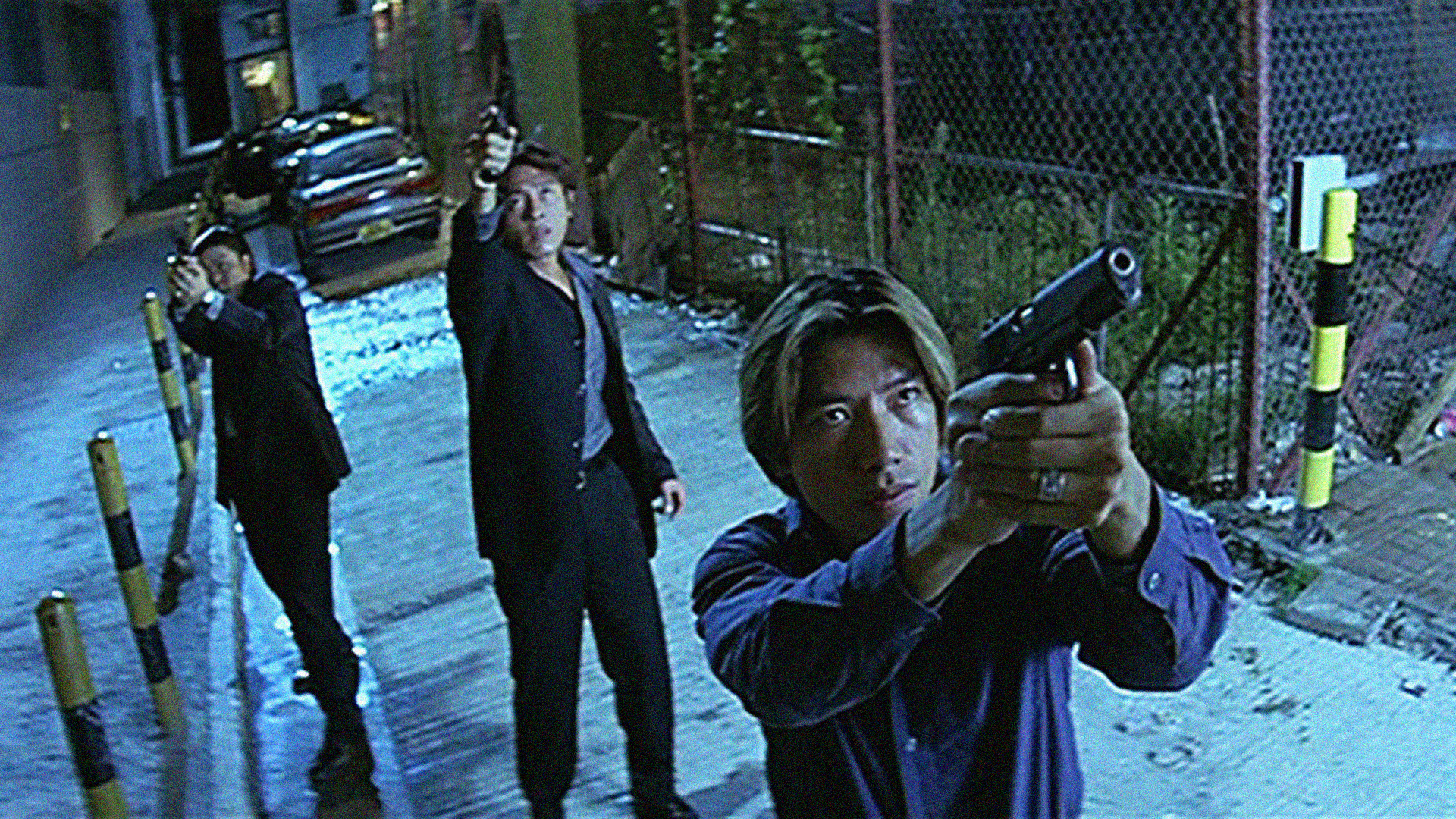

























April 12th, 2023 at 10:22 am
I remember reading that Francis Ford Coppola’s approach to making Dracula was a huge influence on this. In camera, practical effects.